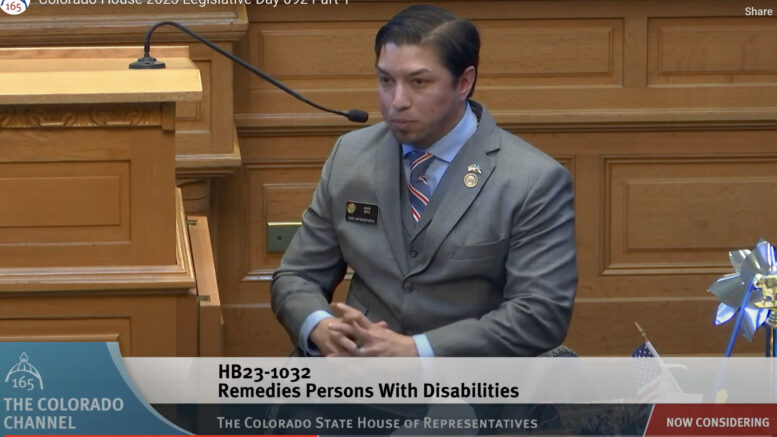A quartet of legislatively created committees has offered a wide range of suggestions to improve the lives of Coloradans with disabilities — including the revival of several ideas to change the state’s anti-discrimination law in a way that could offer larger lawsuit awards.
The Colorado Department of Regulatory Agencies is taking feedback on the suggestions through Monday and then will offer its own recommendations based on that input in about a month. And it’s likely that some of the more significant legal changes will find their way into a bill that will be introduced in the 2025 legislative session.
The four committees that offered the suggestions have roots in the battle over a 2023 bill that, among other changes, sought to let plaintiffs in disability-discrimination cases seek emotional-distress damages and file suits before exhausting administrative remedies. With members of both parties questioning House Bill 1032, sponsoring Rep. David Ortiz, D-Centennial, turned most of it into a study, and the committees examined statutory rewrites and improvements that could be made in government, housing and outdoor accessibility.
Proposed changes
Suggestions include requiring every Colorado jurisdiction to employ an Americans with Disabilities Act coordinator, mandating accessibility reports with property sales and requiring recreational facilities have drop-off locations for people with adaptive equipment. But the suggestions that advocates consider the most important and that business leaders consider the most burdensome are those that involve rewrites of the Colorado Anti-Discrimination Act, including:
- Allowing plaintiffs to seek emotional-distress damages in state court from government agencies or public businesses;
- Removing the requirement that aggrieved individuals exhaust administrative remedies through the Colorado Civil Rights Division before filing a lawsuit;
- Extending the 300-day statute of limitations on disability-discrimination claims to three years;
- Removing caps on damages for discrimination in housing, employment or access to a public entity or public place of accommodation; and,
- Permitting plaintiffs to seek and recover additional punitive damages if they can prove affirmative intent to violate CADA.

Jack Johnson is the public policy liaison for Disability Law Colorado.
“The recommendations are really for the protection of those civil rights and, in a way, for the protection of the quality of life that people in Colorado enjoy,” said Jack Johnson, public policy liaison for Disability Law Colorado.
Pushback from businesses
But Dan Block — a Robinson, Waters & O’Dorisio shareholder specializing in employment and business law — warned that the combination of recommendations not only could lead to more and higher-cost lawsuits but could remove existing opportunities to mediate claims and settle claims without lawsuits. He’s had clients that have been the targets of what he calls “drive-by lawsuits,” in which legal action is filed even before business owners are given the opportunity to fix problems that are alleged.
“It also can definitely lead to much higher expenses for businesses,” Block said.
The suggestion to allow emotional-distress damage recovery encapsulates much of what is likely to be the debate around the suggestions in the coming months.
In 2022, the U.S. Supreme Court ruled that plaintiffs in federal cases no longer could seek such damages, pushing the issue back to the states. Colorado law permits emotional damages to be sought in cases of employment discrimination but not in other cases.
For disability-rights advocates, the issue is a central one because emotional damages are at the heart of many disability-discrimination cases, Johnson said. He cited the case of a mother who could not get into her son’s graduation because there were no accessible entrances and argued that damages are necessary to cure such situations.
Multiple updates on discrimination law sought

Dan Block is a shareholder at Robinson, Waters & O’Dorisio.
Block, however, argued that emotional suffering is unquantifiable, yet some plaintiffs seek six-figure relief that can be devastating to smaller businesses. And if those claims land before a sympathetic jury, arguments about unquantifiability seem to matter less.
Business leaders also have begun expressing concerns about the ability to bypass administrative remedies for lawsuits, as that eliminates several guardrails that seek more negotiated solutions. Among those: civil-rights division employees can examine the facts of the case to determine if any violation has occurred, and they can facilitate ways to resolve the claim that can involve lower monetary inputs, Block said.
Johnson — whose group backs the recommendations generally but hasn’t taken stances on each of the 60 suggestions — argued that the length of the administrative process, combined with the current 300-day statute of limitations, can kill claims on the clock. While both suggested changes may not be needed, state law must be changed in such a way that if the administrative process concludes and disability-discrimination claimants are not happy with the outcome, they still have time to file lawsuits, he said.
Appropriate to revive 2023 discrimination bill?
Johnson said he expects the CADA rewrites will be the first suggestions officials consider, as they are teed up for potential legislative changes and don’t need new funding, unlike some of the other recommendations. Making housing more accessible for those with disabilities, for example, is a major issue, he said, but it’s one that could take some further conversations to figure out the best way to turn that idea into action.
“Codifying the way the law has evolved or ‘Who is a person with a disability and what does that mean?’ is important,” he said, adding that the revamped efforts to do some things that HB 1032 proposed now have stakeholder input and conversations to support them.
Opponents of the most recent bill, however, argue that legislators failed to advance the major changes in HB 1032 out of its first chamber because they felt they were too punitive and could have a cost to businesses that were disproportionate with the violations they were alleged to have committed.
And now the totality of recommended changes to CADA could be both overly burdensome and prohibitively expensive, Block said.
“This could lead to much larger settlements,” he added.
